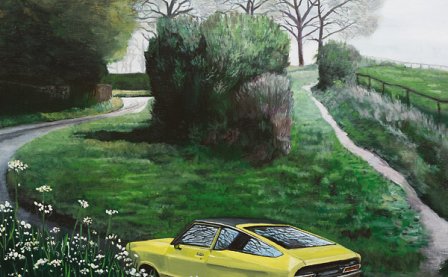I’ve always enjoyed cover versions that put a distinctive spin on the original, even when the cover artist changes a crucial moment that otherwise shapes the initial version. There’s something admirable about intentionally distorting an audience’s personal experience, particularly when the original has its own storied history. On their self-titled album, Food Court not only straddle this contrast beautifully, but also somewhere along the way obscure the very process of the “cover” song. In this case, the “original” is a Medieval choral tapestry titled “fumeux fume par fumée.” It is said to be penned by French composer Solage in the late 14th century and therefore exists today as a plethora of interpretations. Food Court’s album consists of improvised live recordings based on Solage’s score, performed by a group led by James Rushford, Joe Talia, and Francis Plagne.
Presented as two sides, the music is exposed in open space, where the supposed nervousness and vulnerability of the performers are critical to the resulting music. Alongside the instrumentation, we are invited to peer into the mechanics of the recording and the movements of each musician, as pages are turned, objects are knocked, and nominal errors become part of a nostalgic revisiting. These are collaborative sequences that disconnect the thrust of the original and allow the artists to sing through their own wind, string, and percussion instruments, as well as spoken word. The relevance of the score — originally for vocal ensemble — is irradiated through the recording’s personification and celebrated imperfections. But because of how it has been performed, this cover version requires no prior knowledge of the musical inspiration behind it; the music has been stripped of its historical identity, dissected with a knife.
This is achieved through the sweeping pauses that break up each fragment of Side A. The pauses vary in length and start with either a trace of the previous movement, a joined exhalation, or an elongated silence. The rushing swirls of air that are apparent throughout offer a moment to reflect on what’s happened: a segment of Solage’s score has been interpreted and cut off without warning, and you only have a moment to comprehend this before the musicians move on. As a compositional strategy, this gives you a chance to digest the melody, the pace, and the tension that’s built through high and medium pitches. The pauses will often last longer than the playing will, or at least it feels that way, which is also an upshot of the music: it’s discomforting to dwell in, but it also asks you to stop and ponder your response before anticipation kicks back in and you long for the return.
Instead of replicating those pauses later in the record, Side B is glazed in a constant feed of gray breeze that verges on static, with the musicians rekindling fragments of the score amidst an onslaught of acoustic drones and vacuum. This acts as a backdrop to another form of repetition, the monosyllabic vocals, which feel as though they are on a demented loop, a frequency that seldom shifts and that continues to press forward. But the human voice is an essential component here, too, working as a guide, a means of providing clarity and direction within the added drones and suspension of Solage’s score. Instead of trying to comprehend it, you learn to accept its limitations as it carries you across the open space in which the musicians are playing. It’s a stark, unapologetic slab of minimalism that opposes the warmth expressed in so many other renditions, and as it dissolves into the harsh cavity that surrounds it, the only thing left to contemplate is just how breathtaking this version is. Even though Side B is slow and overexposed, there is an incredible amount of detail to be found in the acoustic improvisations that complete the interpretation.
This was never really a cover version, then. Or if it was, the version Rushford and co. were covering hasn’t been identified and would otherwise be impossible to track down. Instead, Food Court acts as an examination of a score and a representation of personal sentiment toward it. As a collaborative effort, it’s outstanding: the musicians are in perfect harmony with one another, and every time a pause breaks or a tempo shifts, even as the volume is steadily increased to the beat of a lost and indiscernible voice, they are a united entity fumbling in unison. And while heavy doses of unease and sublimity come curdled in equal measure here, the melody remains the most contentious attribute, for there is no other record that will have you thinking so intently about silence.
More about: Food Court, Francis Plagne, James Rushford, Joe Talia




